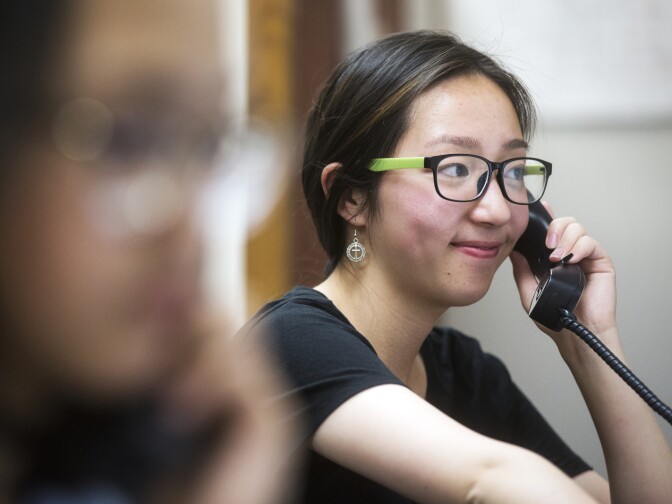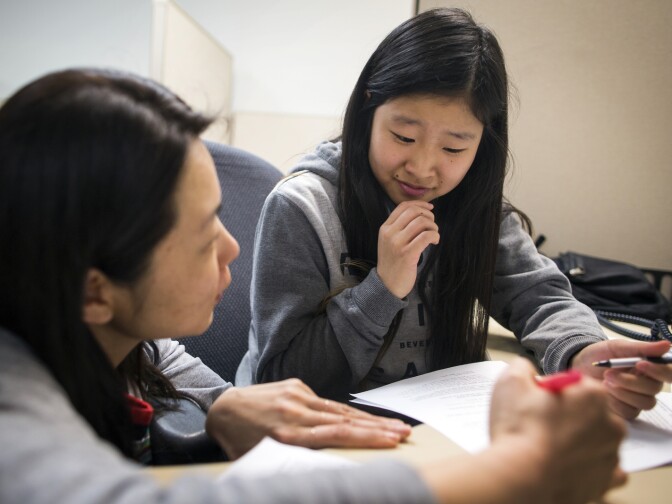This story is free to read because readers choose to support LAist. If you find value in independent local reporting, make a donation to power our newsroom today.
This archival content was originally written for and published on KPCC.org. Keep in mind that links and images may no longer work — and references may be outdated.
In this political year, will Asian-American voters step up to the polls?
In a small downtown Los Angeles office one May evening, Helen Xiang and her teenage son Sam sat side by side, calling a list of Chinese-American registered voters.
Sam spoke in English and his mother in Mandarin, but their message was the same: get to the polls June 7 and vote in the state primary.
“We have to encourage our people to speak out," said Xiang, a 52-year-old Alhambra resident. "Your ballot is really important.”
Xiang arrived from China 20 years ago. She lived then illegally in the United States and worked menial jobs. She's now seeking citizenship, looking ahead to the day when she can cast a ballot and urging registered Asians to vote.
That message can be a hard sell.
Asians rank as the nation’s fastest growing racial group, with about 5.3 million residing in California, yet their potential as voters has yet to come to reach full flower. Only 56 percent of those eligible to vote in 2012 were registered to do so, according to census data.
"It is really difficult to reach out and get them to vote if they’re not even on the radar screens, if they’re not registered to vote," said Karthick Ramakrishnan, a political scientist at University of California, Riverside.
Even when registered, Asian-Amerians lag at the polls. In 2012, fewer than 50 percent of registered Asian-American voters nationally turned out to vote in the presidential election.
Unlike U.S. Latinos whose growth is now fueled by those native-born, the increase among Asians is driven mostly by immigration.
For reasons similar to other ethnic groups with large numbers of immigrants, many Asians don’t engage in elections. Some aren’t U.S. citizens, may not be fluent in English, face cultural challenges or have a distrust in governments carried over from their birth countries.
They also aren’t monolithic and have different issues that matter to them.
But with the 2016 primary just around the corner, get-out-the-vote efforts aimed at Asian-Americans are in full swing and focused on increasing their impact at the polls.
In Los Angeles, community advocacy groups like Asian Americans Advancing Justice have been setting up phone banks and recruiting volunteers like the Xiangs to make calls.

"We have about 10 volunteers right now that are making calls in five different languages," said Kelly Osajima with Asian Americans Advancing Justice in Los Angeles as she monitored the evening's phone bank effort.
Volunteers were making calls in Mandarin, Korean, Vietnamese, Bangla and Thai, targeting "voters who don’t vote frequently, so they don't get reached out to by mainstream campaigns," Osajima said.
"We are providing that personal contact to them that they wouldn't get otherwise," she said. "We're speaking in their language."
While the challenges of reaching Asians remain, the numbers who are engaging are slowly improving, said Stewart Kwoh, executive director of Asian Americans Advancing Justice in Los Angeles and a KPCC lifetime trustee.
“In the United States, there are probably about two million Asian-Americans who are eligible to become citizens, but haven’t applied," Kwoh said. "We’re seeing that changing. In our own work, we are seeing a doubling of the citizenship applications.”
Kwoh said many of those applying for citizenship say they want to vote in the November election. He believes that anti-immigrant remarks in the presidential campaign has played a part.
Results from a survey of 1,200 Asian-American voters released this week by AAAJ says the rhetoric of the campaign has captured their attention: anti-Muslim and anti-immigrant sentiment caused more than 40 percent of Asian-American voters to state they would not vote for a candidate who expressed those views.
Observers like UC Riverside's Ramakrishnan said one way to reach Asian-American voters is through issues they care about. They are less interested in individual candidates than in concerns like education, health care and immigration.
This year, Democrats Hillary Clinton and Bernie Sanders made reaching out to Asian-American voters a part of their campaigns in California. Even Republican Donald Trump has galvanized voters -- largely in opposition, but he has Asian supporters as well.
While Asian-American voters tend to lean more Democratic than Republican, about a third claim no party affiliation. Having no party connection makes such voters hard to reach. That is particularly true of English-speaking, second-generation Asian-Americans.
“What we have seen from recent elections is that Asian-American youths 18 to 29 years old have the lowest voter participation of any voter group in the country,” Ramakrishnan said.
Sam, Helen Xiang’s son, turned 18 this year. He said he knows many Asian-Americans his age who aren’t all that interested in voting.
“They think that just because they have freedom, they have the option to avoid the political system,” he said.
In sharp contrast, his mother is excited about voting. Xiang said she feels a sense of indebtedness to the United States: her son survived serious health problems when he was a child, and despite being poor, she said he got excellent care here.
Before Sam and his mother turn back to the phone bank, Sam sums up his philosophy:
“There is a famous quote out there. The quote is, 'Be the change you want to see,'" he said. "So what I’m trying to do here is start that domino effect, basically, to start encouraging people to vote and vote myself.”
Sam and his mom plan to volunteer as poll workers during the June primary. Then they hope to cast their votes together in November.
Series: California Counts
California Counts is a collaboration of KPBS, KPCC, KQED and Capital Public Radio to report on the 2016 election. The coverage focuses on major issues and solicits diverse voices on what's important to the future of California.
Read more in this series and let us know your thoughts on Twitter using the hashtag #CACounts.













